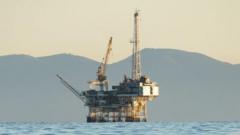President Joe Biden has announced a far-reaching ban on new offshore oil and gas drilling along most of America’s coastline, just weeks before Donald Trump’s inauguration. The official ban, which now covers all of the Atlantic Coast, the eastern Gulf of Mexico, and parts of the Pacific coast off California, Oregon, and Washington, is one of Biden's last-minute climate initiatives as he seeks to cement environmental protections before the administration changes.
Biden highlighted the potential risks of drilling, stating, “It is not worth the risks,” emphasizing the protection of coastal communities and ecosystems. Despite conditionally supporting fossil fuel expansion, Trump has vowed to immediately reverse this ban upon taking office. However, legal complexities may hinder such a reversal due to existing laws that require Congressional action for any changes to previous bans.
The ban shields over 625 million acres of U.S. waters from drilling, aiming to counterbalance the stark realities of climate change as demanded by environmental advocacy groups. Support for Biden's decision has poured in from environmentalists, with calls for stronger climate initiatives growing louder. Yet, Trump’s camp has criticized the ban, labeling it a "disgraceful decision” and urging Congress to overturn it.
As legal battles loom over the future of drilling rights in U.S. waters, the situation encapsulates the ongoing partisan divide on energy policies and climate change, highlighting the conflicting priorities between Biden's environmental protection measures and Trump's commitment to fossil fuel production. With the Supreme Court potentially involved, the debate over these crucial environmental policies is far from over.



















